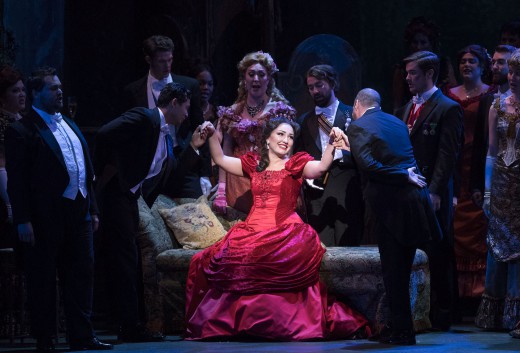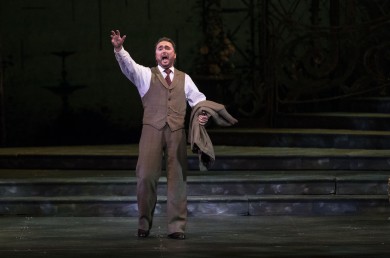Stellar voices power Palm Beach Opera’s luxurious, heartfelt “La Traviata”

Kristina Mkhitaryan, center of attention as Violetta in Palm Beach Opera’s “La Traviata.” Photo: Bruce Bennett
Verdi’s La Traviata captures the glamorous side of opera, with its setting in the world of 19th century Parisian aristocrats and its glittering party scenes.
Palm Beach Opera’s winning performance Friday, in a season opener driven by three strong singers in the main roles, portrayed this rarefied world with lavish sets and costumes while keeping the focus firmly on the human drama at its center. An energetic orchestra and committed, technically proficient singing ensured performers weren’t upstaged by the production.
For all the luxuriousness of the sets, with their chandeliers, elegant furniture and sharply attired guests, the Parisian interiors from Lyric Opera of Chicago came off as gloomy and forbidding. Threadbare shrouds hung from the ceilings, giving a touch of Castle Dracula to these aristocratic salons that seemed to foretell the doom of the heroine Violetta.
In an opera filled with great moments, for sheer dramatic punch it’s tough to beat the Act 2 gambling scene: The hero Alfredo and his romantic rival Baron Douphol transfer the male battle to the card table, gambling like a couple of bighorn rams going at each other, as Violetta floats soaring wails of distress.
Set in a dramatically red-drenched salon, the scene unfolded Friday at a crackling pace as conductor Antonello Allemandi drove the tense music forward. As Violetta, the soprano Kristina Mkhitaryan arched ascending notes over the battle in a warm, lyric tone of despair, bringing a moving pathos to the scene, which climaxed in a brilliantly paced confrontation that gave maximum force to the drama.
Mkhitaryan, who made her Metropolitan Opera debut this season as Lauretta in Puccini’s Gianni Schicchi, sang throughout La Traviata with a plushness matching the opulence of her surroundings. In a subtle, shaded performance, she showed a gift for living the role on the stage, appearing to be improvising as she portrayed the dying courtesan’s desperate hope for love, with grand outbursts of romantic passion, softly floated high notes and raw emotion. She brought a breathy, frantic bravado to “Sempre libera,” singing with agility and clarity in the fast-moving aria. Her outburst “Amami, Alfredo,” (“Love me, Alfredo”) arched through the hall with convincing passion.
She put character and drama front and center, with no sense of a staged vocal recital that sometimes attends operatic performances. In the third act, she let her voice become bleak and glassy, as she prepared to meet her doom in her gloomy bedroom. (The role will be sung Saturday by the soprano Jacqueline Echols, with Mkhitaryan returning Sunday.)
As Alfredo, the Russian tenor Alexey Tatarintsev radiated romantic passion, guilt, conflict and anger. His opening Brindisi came off with the easy light touch appropriate to a drinking song, with crisply executed ornaments. In “Un di felice, eterea” his love song to Violetta, he sang with a smooth lyricism, with the titular words “Croce e delizia” (“Torment and delight”) coming off as the climactic point they were intended to be, with piercing Italianate ardor.
Although his voice sometimes seemed a little small for the role, it acquired a nice hard edge whenever his character got angry, and he brought furious energy to the gambling scene. (The tenor Derrek Stark will sing the role Saturday, with Tatarintsev returning Sunday.)
There are different ways to portray Alfredo’s father, Germont, who shows up in Act 2 to ruin everything. In some interpretations, he’s an imposing patriarch, in others a warm father figure.
The baritone Massimo Cavalletti opted for warmth. Appearing as the portrait of middle-class respectability, with his gray beard, dark suit and bowler hat, he sang with a golden, rich legato as he persuaded Violetta to leave Alfredo for the good of his family. His voice took on a dark luster in his duet with her, as he sang “Piangi, piangi” (“Weep, weep”), as she agreed to the sacrifice. In “Di Provenza,” as he reminds Alfredo of his home, he sang with easy, flowing warmth.
All the smaller roles were handled well, with the baritone Ben Schaefer doing a fine job bringing out the entitled arrogance of Alfredo’s rival, the Baron Douphol.
Under Allemandi’s baton, the opera company’s reliable orchestra gave a performance that captured the music’s nervous tension, pathos and soaring romanticism. From the ethereal clarity of the opening notes, high in the violins, to the spirited figures that punctuate the drama, this was orchestral work full of character and apt detail.
The conductor masterfully handled the big ensemble moments, such as the grand combination of chorus and soloists that concludes the second act. The chorus, for its part, gave fine, accurate voice — rich and balanced — to the dissolute upper-class partiers witnessing the drama.
Stage director Fabio Ceresa organized a natural, fluid performance that matched the realistic sets, with lots of details in the antics of the drunken aristocrats. The second-act dance numbers — often a sloppy low point in La Traviata stagings — came off as elegant, skillful and seductive, with Ballet Palm Beach matching the high standard of the singing.
Palm Beach Opera’s production of La Traviata will be repeated 7:30 p.m. Saturday and 2 p.m. Sunday. pbopera.org; 561-833-7888.
Posted in Performances
Leave a Comment
Sat Jan 26, 2019
at 2:00 pm
No Comments







